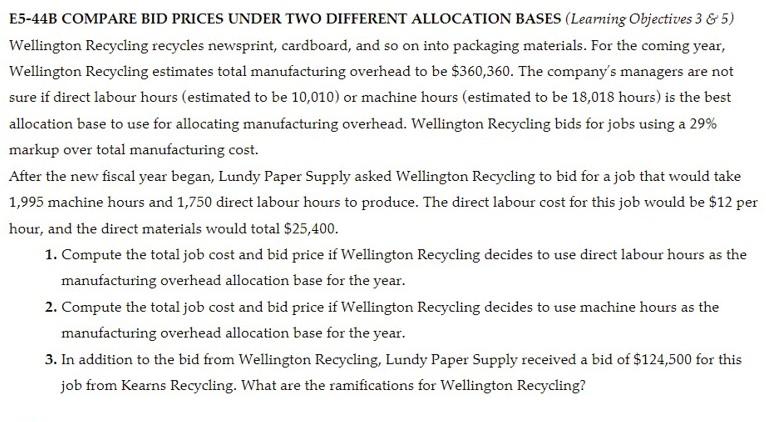Answered step by step
Verified Expert Solution
Question
1 Approved Answer
E5-44B COMPARE BID PRICES UNDER TWO DIFFERENT ALLOCATION BASES (Learning Objectives 3 & 5) Wellington Recycling recycles newsprint, cardboard, and so on into packaging

E5-44B COMPARE BID PRICES UNDER TWO DIFFERENT ALLOCATION BASES (Learning Objectives 3 & 5) Wellington Recycling recycles newsprint, cardboard, and so on into packaging materials. For the coming year, Wellington Recycling estimates total manufacturing overhead to be $360,360. The company's managers are not sure if direct labour hours (estimated to be 10,010) or machine hours (estimated to be 18,018 hours) is the best allocation base to use for allocating manufacturing overhead. Wellington Recycling bids for jobs using a 29% markup over total manufacturing cost. After the new fiscal year began, Lundy Paper Supply asked Wellington Recycling to bid for a job that would take 1,995 machine hours and 1,750 direct labour hours to produce. The direct labour cost for this job would be $12 per hour, and the direct materials would total $25,400. 1. Compute the total job cost and bid price if Wellington Recycling decides to use direct labour hours as the manufacturing overhead allocation base for the year. 2. Compute the total job cost and bid price if Wellington Recycling decides to use machine hours as the manufacturing overhead allocation base for the year. 3. In addition to the bid from Wellington Recycling, Lundy Paper Supply received a bid of $124,500 for this job from Kearns Recycling. What are the ramifications for Wellington Recycling?
Step by Step Solution
There are 3 Steps involved in it
Step: 1

Get Instant Access to Expert-Tailored Solutions
See step-by-step solutions with expert insights and AI powered tools for academic success
Step: 2

Step: 3

Ace Your Homework with AI
Get the answers you need in no time with our AI-driven, step-by-step assistance
Get Started


